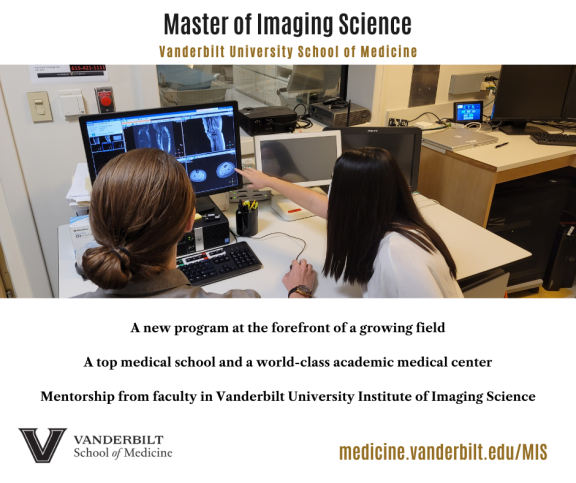A new, one-of-a-kind master’s program is coming to Vanderbilt University that highlights the field of imaging science and gives students insight into the wide array of medical imaging modalities.
The Vanderbilt University Institute of Imaging Science has joined with the School of Medicine to create the Master of Imaging Science degree program.
VUIIS is known for developing new tools in radiology and imaging to meet the need of academics and medical professionals. They also push existing machinery further, understanding and utilizing imaging modalities to their full potential.
With the continuing creation and advancement of imaging equipment and procedures, there’s a need for qualified professionals to create these new machines, operate them, and use them in research.
“There’s a big gap in the field right now,” says Dan Gochberg, PhD, Graduate Studies Director and Professor of Radiology and Radiological Sciences. “You have imaging techs who have lots of expertise on the detailed interaction with machines and patients, and then you have PhD level researchers who are coming up with new methods and new applications. And then this big gap in the middle.”
This gap is what drove leaders at VUIIS and VUSM to create the program, where students will not only learn about the diagnostic functions of medical imaging, but they’ll also be exposed to various modalities that are key parts of clinical work and medical research.
“Imaging is playing such an important role these days in areas like drug development,” says Todd Peterson, PhD, MIS Program Director and Professor of Radiology and Radiological Sciences. “Going through this gives students a broader understanding of all the imaging modalities. This could contribute to someone having a lot of opportunity.”
The MIS program is one of only a few programs in the country offering a specialized curriculum focused solely on imaging science. Vanderbilt's state-of-the-art imaging facilities, including the Institute of Imaging Science and the Vanderbilt University Medical Center, provide students with unparalleled access to cutting-edge technology and research opportunities.
“At VUIIS, we're working at the cutting edge across all of the modalities,” says Dr. Peterson.
The 12-month degree program, starting in August 2023, will immerse students in the full array of biomedical imaging with a mix of lab and classroom instruction across topics like medical imaging physics and engineering, imaging analysis, and AI in medical imaging.
According to Gochberg and Peterson, the classroom work will be interactive.
“Image Processing will be hands-on,” says Dr. Peterson. “Even though it's a course, you're going to be spending time working with images and the data.”
The proposed curriculum for the first year of this program includes core classes such as Medical Imaging Physics and Engineering, Computing and Image Processing, and Imaging Biomarkers. Labs like Image Acquisition and Imaging Application will provide even more hands-on work obtaining and analyzing data with MRI, PET, CT, and other imaging sources.
Students will spend two semesters learning and working in classes and labs, with their efforts culminating in a summer research project.
This project is where students will contribute to a specific research area under the supervision of a faculty member. They will gain experience working in a research lab and present their work at an annual student research forum and provide a written report.
During the year, students will also attend seminars to watch presenters and learn more about the research.
“There they’ll get exposed to things like responsible conduct of research and gearing up for their summer research project,” says Dr. Gochberg.
Through this mix of coursework and research, MIS graduates are well-positioned to pursue a range of career paths.
They might go to work in medical imaging, developing new imaging techniques and technologies. They also can pursue more work in medical research, possibly going on to medical school in hopes of becoming a radiologist.
“There isn’t any single outcome that we're expecting,” says Dr. Peterson. “It's not like you go to law school, you're going to become a lawyer. This is a little bit different than that.”
Peterson and Gochberg say they’ve heard from MRI technologists interested in advancing their careers and from students interested in medical school looking for more experience working with all types of imaging modalities.
“There’s a variety of people for whom this might be of interest in and benefit,” says Dr. Peterson. “One that pops to mind is people who maybe just finished a bachelor's degree and maybe thought about medical school or thought about a PhD program, but they know they liked research. They know they like biomedical sort of stuff. This gets them some more advanced exposure in something that maybe will inspire them to go to medical school or equip them to be prepared for research jobs right out of this program.”
Dr. Gochberg and Dr. Peterson say they’re excited for the program to get going. They and other leaders at VUIIS have been imagining and planning this for many years.
“The labs are what I’m most looking forward to,” says Dr. Gochberg. “It’s a class I would like to take. Image processing where they get a whole bunch of different modalities, take that data, and then go analyze it. Working with computer programing. It’s the complete package.”
“It feels good to launch the program because we’ve been talking about it for a long time and now we’re doing it,” says Dr. Peterson. ”It’s exciting because it’s just amazing the amount of fascinating things going on in the imaging science field.”
Applications are now open for the inaugural class of the program.
